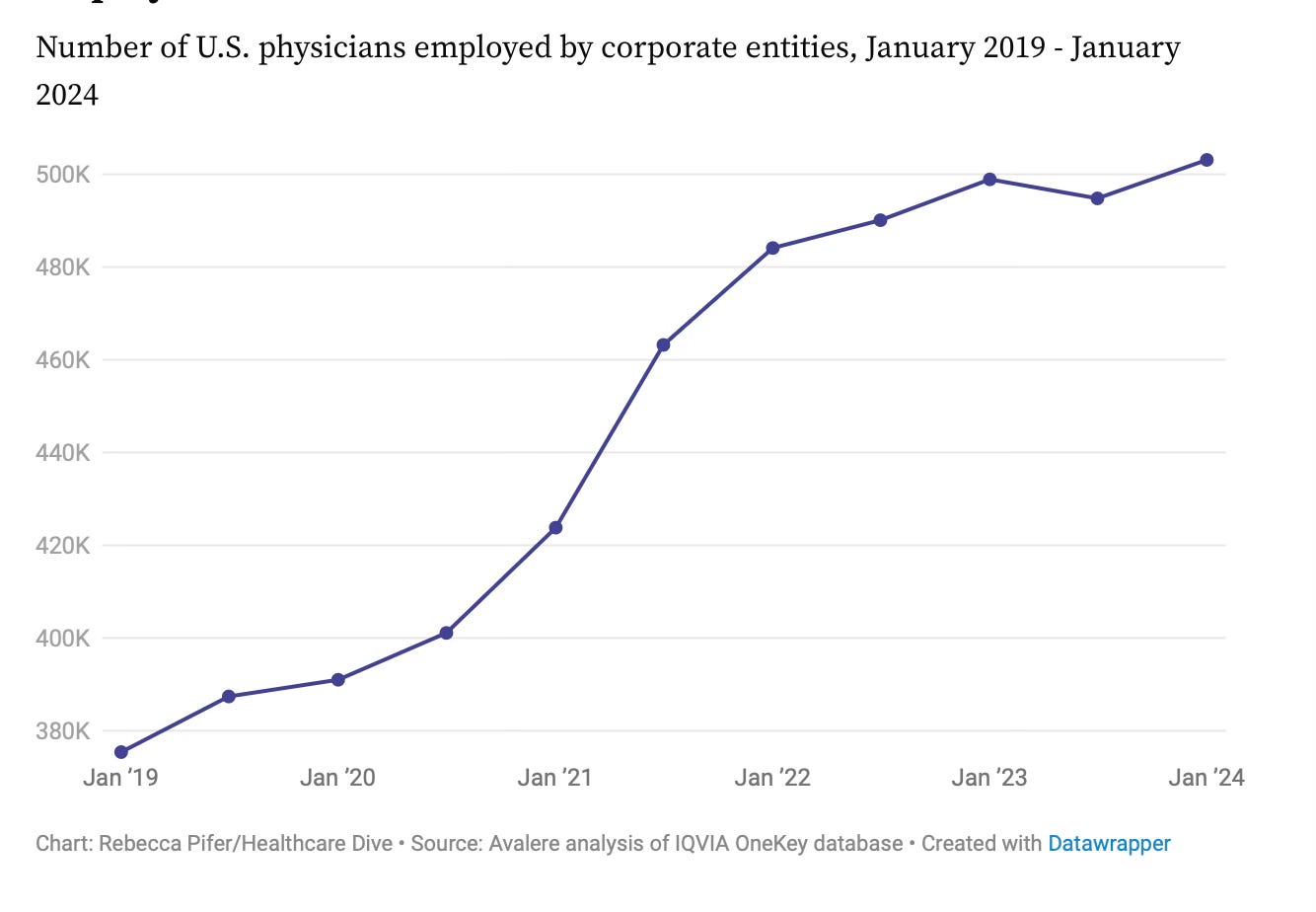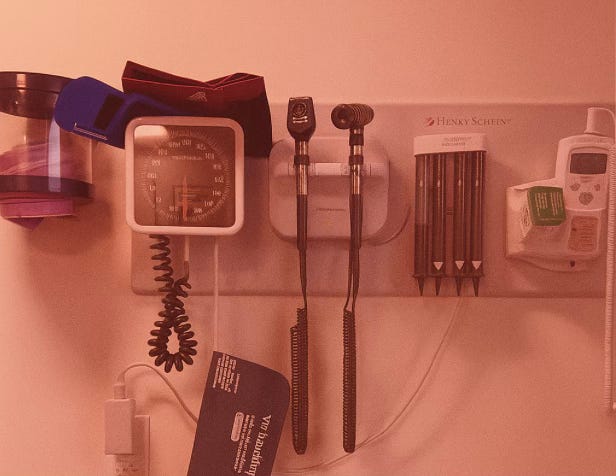Is primary care just going to be triage?
Consolidation is ruining primary care
I’m on the hunt for a pediatrician for my baby son, and because I work at AELP, I’m trying to find an independent practice. But there are fewer independent doctors than ever, and it’s clear why — the reimbursement environment is tough, the trend toward consolidation is a disaster, and you have to be a special combination of excellent doctor and business operator to survive.
Indie docs are a dying species
Independent practices are struggling. Nearly 80% of doctors now work for a corporate entity, a number that increased following the chaos of the early Covid period. For doctors trying to stay independent, the margins are low, the regulatory and administrative burden is high, and they’re on the weaker side of a consolidation arms race: the bigger the insurers get, the more doctors need to consolidate to keep their ability to negotiate competitively. In 2024, a survey of physicians by the AMA found that the most frequently cited reason for why the physicians had sold their practices to a corporate entity was the need for more negotiating power.

Some corporations are at the vanguard of that arms race — UnitedHealth is a notorious acquirer, and despite its recent troubles, it preferences its own physicians above others by reimbursing them more.
Over the last few years, Medicare Advantage — and the option to risk adjust the patient population into higher reimbursement rates — increased corporate interest in primary care and acquiring primary care practices. One Medical, among others, benefitted from this dynamic, with half of its 2021 net revenue coming from MA, even though MA patients only comprised 5% of its patient population.
MA is increasingly the subject of scrutiny, with the Office of Inspector General at HHS publishing a report in 2024 referring to risk adjustments as “questionable.” So far, though, the Trump administration continues to signal support for Medicare Advantage, including in the form of increased reimbursement rates in 2026. Given this, primary care will likely continue to be an acquisition target for the near future.
The paradox of primary care
So when physician practice owners are faced with a choice — stay independent or consolidate — the incentives are stacked in favor of consolidation. But that’s generally bad for society as a whole and for the physicians themselves. Corporate-owned physician practices, especially private equity-owned ones, tend to have a higher cost of care with no benefit to quality. Private equity-owned hospitals see an increase in mortality and other adverse events.
For physician practices, even being acquired by a health system removes a lot of provider choice. As Stacey Richter put it in a recent episode of Relentless Health Value, health system acquisitions lead to the “paradox of primary care;” i.e., integrated health systems both buy up primary care doctors and have an incentive not to use them. Why? Because health systems tend to make most of their money through specialty care, which means they’re incentivized to have their primary care doctors kick up as many patients to specialty care as possible.
Which means that primary care doctors become glorified triage agents, rather than fully practicing, autonomous physicians.
What are the options?
So what options do physicians have if they want to stay independent? This is a topic I’ve been working on (and relatedly, would love input into, especially if you’re a physician or practice manager). What are the potential sources of capital? There are small business loans, although that presumably requires an expectation that your practice will improve its income over time, which may be difficult given the current policy and reimbursement environment. There’s venture capital, although that requires a plan to get a high rate of return in a relatively short period of time (a model that I suspect does not fit many healthcare businesses). And there’s consolidation.
But what about consolidation with other doctors? I found a pediatric practice in Austin that seems to be taking another path — consolidating with other practices who want to stay independent. They’ve formed a Group Without Walls (GWW), an ACO-like model that merges administrative work and standardizes reimbursement rates but otherwise lets the individual doctors practice as they wish. It’s not a new concept, but not a common choice by physicians either. I suspect that it’s because being acquired is easier than forming a consortium (although over the long term, the consortium is probably more physician-friendly!) — but again, if you’re a physician or practice manager and have an answer, please let me know.
The future of independence in medicine
For those of us who are convinced of the measurable benefits in letting doctors stay independent (and making independent small practice a viable and appealing model for medical school graduates), the future looks bleak.
That said, as more primary care physicians realize that being acquired often means they become triage agents, perhaps the tide will turn. American healthcare is built on a foundation of primary care doctors, and removing them (especially in favor of AI models or similar, which I’m currently not compelled by) would increase costs. In other words, there are clear policy benefits to incentivizing primary care doctors (and other providers) to stay independent and to keep primary care practices physician-owned. And I did find an independent pediatrician for my son, so maybe there is hope?


While much of primary care seems to be shifting toward triage, it's worth noting that Direct Primary Care (DPC) is actually growing rapidly as an alternative model. More physicians are choosing DPC to maintain autonomy, provide deeper patient relationships, and escape the typical fee-for-service grind and administrative burden. It's an encouraging sign that not all doctors are resigned to becoming 'glorified triage agents' some are building new models focused on genuine, highly personal care.
The triage model of primary care is a disaster. I unwittingly got caught up in it a few years ago and I still don't trust corporate primary care. I was able to find a direct primary care doc a year later and finally got the proper referrals and basic clinical and interpersonal competence. Corporate primary care docs are caught in a vise between the jaw faces of Big Hospital and Big Insurance.